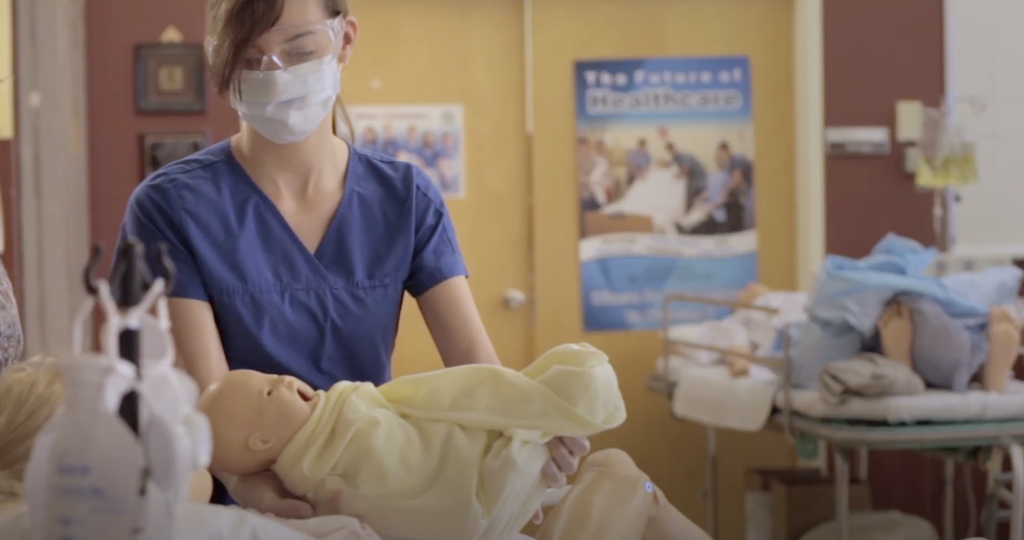Program Specific Requirements & Additional Information
Applicants and students in the Collaborative Bachelor of Science in Nursing program are required to disclose all education, which requires submission of all prior educational transcripts from high school and post-secondary studies. Failure to fully disclose your educational documents could be grounds for dismissal from the program.
The BScN program is oversubscribed and receives more than enough qualified applicants to fill the seats available. Applicants accepted into oversubscribed programs confirm their offer and pay their fees early to reserve a place in the program.
Work Integrated Learning Opportunities
An essential part of nursing education consists of clinical placement experiences. Students in the BScN program will enter the clinical environment for experiential learning in every semester of the program, beginning in semester one.
There are mandatory clinical requirements all students must complete, and submit, in order to participate in clinical placements/practicums.
On admission to the BScN program students must complete and submit all mandatory clinical requirements by the due date of August 15th . Students entering the program are strongly encouraged to initiate the completion of all mandatory clinical requirements by no later than June 1 to ensure that they avoid potential delays with the access to CPR/First Aid training opportunities and medical appointments for Immunization/Communicable Disease Testing Requirements/required vaccinations.
The package containing information about mandatory clinical requirements can be found here:
Requirements for Clinical Placements
- Completed Immunization/Communicable Disease Testing Requirements forms, supplied by the College
- Current Basic Cardiac Life Support Certificate (BCLS/C.P.R. – HCP Level)
- Standard First Aid Certificate (or equivalent)
- WHMIS Certificate (may be obtained at a minimal cost through the College)
- A recent Canadian criminal reference/vulnerable sector check (original only/photo copy not accepted) – must be applied for no earlier than July 1st of the current year and is required prior to the start of the fall. Do not delay initiating the request for this after July 1 to ensure you are not faced with a processing delay to meet the Aug 15 submission deadline.
- Mask Fit Testing. This will be offered in September, on campus by the Nurse Training Officers. See below for more details.
- AODA certificate
- Workers Safety Awareness in 4 Steps training certificate (free of charge, access via link to Ministry of Labour)
For more information please review the BScN Nursing Clinical Requirements [PDF, 441 KB] or BScN Nursing Clinical Requirements (International) [PDF, 1.3 MB] document.
In years 2, 3 and 4 of the BScN program, students are also required to submit annual mandatory clinical requirements. CPR re-certification, Canadian criminal reference/vulnerable sector check, WHMIS recertification, mask fit, and immunization updates are required annually and are to be completed by August 1st of each year.
Any costs for these tests/certifications will be the responsibility of the applicant. Students who do not comply with the immunization requirements will not be allowed into the clinical practice settings, and as such will not be able to complete the required practicum to graduate from the program.
Please note:
COVID-19 vaccinations are required for all students in the Bachelor of Science in Nursing, Practical Nursing and Personal Support Worker programs, in order to be permitted to attend clinical hours with the Timmins & District Hospital. Please review the BScN Nursing Clinical Requirements [PDF, 441 KB] or BScN Nursing Clinical Requirements (International) [PDF, 1.3 MB] document to ensure you are up-to-date on vaccinations for your clinical requirements.
Clinical partner agencies may choose to create their own policies regarding mandatory student immunization against COVID-19 as a protective measure for residents and patients. Northern College is required to adhere to these policies as a requirement for staff and students attending clinical.
Students are required to submit documentation of receiving COVID-19 vaccination prior to attendance at our partner health care agencies. The health care agencies have confirmed their policies stating that all students are required to be immunized for COVID-19 in order to care for residents and patients. Students who do not meet this requirement will not be permitted to attend clinical hours and will not meet the expectations for the practical component of the program course, which will result in course failure. There will be no exceptions for this requirement. Students must submit a copy of the official documentation for having received these vaccinations. For more information please review the BScN Nursing Clinical Requirements [PDF, 441 KB] or BScN Nursing Clinical Requirements (International) [PDF, 1.3 MB] document.
To be eligible for participation in clinical training, the student must not have been convicted of any criminal offence for which they have not been pardoned. An unpardoned criminal record will result in inability to participate in clinical practice courses and could prevent the student from graduating. A criminal record may also impede the student’s ability to write the National Registration Exams required for nursing employment in Canada. As of January 1, 2005, the College of Nurses of Ontario (CNO) requires all applicants for registration or reinstatement from within Canada to provide a recent Canadian Police Information Centre Criminal Record Synopsis (CPIC or OESC check) as part of the registration process. The criminal record check registration requirement enhances public protection by allowing CNO to identify those who have criminal records that could affect their suitability to practice nursing.
Students are responsible for the cost of appropriate uniforms and equipment (e.g. stethoscope, watch, etc.) required for the clinical area as well as transportation to/from practicum placements. Although we make every effort to accommodate the student’s preference of clinical placement location, students should be aware that they may be placed in a community outside of Timmins, which may entail travel. Students are responsible for arranging transportation to and from clinical agencies, and they are responsible for all associated costs, including any overnight accommodation. Clinical days may include weekends and start/end times will reflect agency hours.
Mask Fit Testing
This program requires that students wear a full-face self-contained breathing air (SCBA) mask and an approved N95 particulate respirator during certain learning situations reflective of safe workplace practice and standards. To successfully complete Mask Fit Testing to wear an SCBA mask and N95 mask, students shall present themselves for fit testing free from interference of hair where the respirator seals to the skin or neck. Students are required to be clean-shaven or have no hair where the mask seals to the skin.
Essential Requirements for Study in Baccalaureate Nursing Programs in Ontario
Do you have the Requisite Skills and Abilities to Practice Nursing in Ontario? The College of Nurses of Ontario (CNO) regulates nurses in Ontario. It issues the license that each nurse must obtain in order to practice. The CNO “is accountable for public protection by ensuring that nurses in Ontario are safe, competent and ethical practitioners” (CNO, 2014). The CNO fulfills its mandate to protect the public interest in several ways. This includes establishing the competencies required for safe, competent, ethical nursing practice, developing and enforcing nursing standards within which all nurses and nursing students must practice, determining whether applicants for registration have the requisite skills and abilities (RSAs) to provide safe, competent, ethical nursing care, and issuing a license to those who meet the CNO’s criteria for registration (CNO, 2014).
Legislation in Ontario allows student nurses to practice nursing as part of their educational program. Prior to applying your skills and knowledge in the clinical setting, you will be provided multiple opportunities to practice in the nursing praxis lab. In both lab and placement settings, you must successfully demonstrate that you meet the entry to practice competencies you have been taught, and possess the RSAs necessary to provide safe, competent, ethical nursing care.
Students considering the BScN program should review the College of Nurses of Ontario (CNO) document “Requisite Skills and Abilities for Nursing Practice in Ontario [PDF, 180 KB]”, The skills and abilities outlined in this document must be demonstrated in order to become a nurse in Ontario. Applicants who wonder whether or not they have the requisite skills and abilities to be registered as an RN or RPN should contact the CNO to explore the kinds of supports they might require.
The Council of Ontario University Programs in Nursing further outlines the requirements for study [PDF, 1.20 MB].



